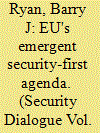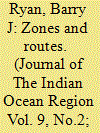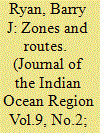|
|
|
Sort Order |
|
|
|
Items / Page
|
|
|
|
|
|
|
| Srl | Item |
| 1 |
ID:
168421


|
|
|
|
|
| Summary/Abstract |
This article details the evolution of maritime security from the perspective of its impact on the historical architecture of sea space. It argues that, as the fundamental unit of governance, zoning provides keen insight into the mechanics of maritime security. The article observes that Britain's Hovering Acts in the late eighteenth century represent the earliest example of modern zonation at sea and that they exhibit a shift from early modern territorial claims based on imperium and dominium. The article explores the way these hovering zones shaped the rationale underlying contemporary maritime security. It finds that maritime security has effectively relegated national security to a minor spatial belt of state power, while elevating non-traditional understandings of security to the level of global existential threat. The future of maritime security is under construction. Increasingly segmented by interconnecting, overlapping, multi-functional zones that seek to regulate all free movement and usage of the sea, security developments are reorganizing the maritime sphere. Nonetheless, the article argues, despite the novelty of this development, a historical military logic persists in new formations of security-oriented practices of maritime governance.
|
|
|
|
|
|
|
|
|
|
|
|
|
|
|
|
| 2 |
ID:
089528


|
|
|
|
|
| Publication |
2009.
|
| Summary/Abstract |
This article forms a critique of security sector reforms implemented in Albania and Montenegro between 2000 and 2007 by and on behalf of the European Union. It argues that within these reforms it is possible to discern a tension between a more holistic development approach and a security-based approach that is top-down and largely founded on the self-referential security concerns of the European Union. Drawing on research conducted by the author in Albania and Montenegro, the article utilizes public surveys to point out the distance between internal security reforms funded by the EU and the everyday security concerns of residents living in ineffectively policed states. The article concludes that a security-first agenda has slipped into the EU's aim to create an area of `freedom, security and justice'. Thus, while the rims of the Western Balkans are being secured, lack of reform in the interior hampers the socio-economic development and democratization of states engaged in the EU enlargement process
|
|
|
|
|
|
|
|
|
|
|
|
|
|
|
|
| 3 |
ID:
076741


|
|
|
|
|
| Publication |
2007.
|
| Summary/Abstract |
Based on research undertaken in southern Serbia following the introduction of multi-ethnic policing units, this article examines the pluralist intentions behind attempts to democratize security through community-oriented policing (COP). It details the achievements and the limitations of attempts to institute multi-ethnic policing as a foundational strategy for COP. Evidence is presented that the reforms did not sufficiently empower local actors over centralized institutions. The article illustrates the limitations of COP, arguing that de-securitization requires the creation of spaces wherein the local order being maintained by a locally accountable police is open to deliberation.
|
|
|
|
|
|
|
|
|
|
|
|
|
|
|
|
| 4 |
ID:
120472


|
|
|
|
|
| Publication |
2013.
|
| Summary/Abstract |
This article introduces reasonable force as ontological to the performance of late modern police power. It argues that policing emerged through reasonable force as an innovation of military power and as a supplement to legal power. The article tracks the development of reasonable force in late modern policing through to its emergence as a vanguard strategy of post-Cold War global governance. Police power, the article finds, has transformed traditional sovereign power relations to incorporate governmental power. It finds policing power to be an expansive reforming force that exhibits a dynamic capacity to provide relational coherence to multi-layered policing constellations from the local to the global.
|
|
|
|
|
|
|
|
|
|
|
|
|
|
|
|
| 5 |
ID:
142499


|
|
|
|
|
| Summary/Abstract |
This article explores maritime protection zones (MPZ), which are being created in the territorial waters of a number of European states. Through the work of Gaston Bachelard and Peter Sloterdijk, the article analyses maritime zonation as a paradigmatic global security mechanism. It examines how maritime spatial planning seeks to reconfigure sea-space into multi-dimensional spheres of predictability and rationality. These processes, it proposes, seek to routinize the use of sea-space and reconcile tensions between the governance of land and sea, and between fixed infrastructure and mobile capital flows. The political and economic redistribution at stake in the construction of a global network of vast maritime zones, which act as hubs of wealth creation and environmental management, creates further tensions where commercial and military security imaginaries meet local and ecological interests. The article traces the ontology of multi-dimensional zonation and concludes that space which emerges from a pluralist and less anthropocentric understanding of the maritime would provide more effective security.
|
|
|
|
|
|
|
|
|
|
|
|
|
|
|
|
| 6 |
ID:
166756


|
|
|
|
|
| Summary/Abstract |
We most commonly encounter the word defiance when used as an adverb to classify a peculiarly courageous or risky act of resistance. However, the use of the word defiance in this way is a departure from the historical meaning of the word. Moreover, it occludes the possibility that there exists political activity that is manifestly defiant. The article takes issue with this tendency and identifies a mode of resistance that is explicitly defiant. In order to do this, the paper draws from the phenomenological approach underpinning the standing sculptures of the British sculptor Antony Gormley. This informs an exploration of the protest enacted by the standing man of Taksim Square, who participated in a large antigovernment movement in Turkey in 2013. In acts we might distinguish as defiant, the paper demonstrates the materialist vulnerability of the protesting body, the aesthetic ontology at work, the prevalence of the standing metaphor, the role of silence, and the absence of futurity. By unearthing defiant modes of protest, the heterogeneity of resistance is affirmed, and a new domain where art encounters the political is revealed.
|
|
|
|
|
|
|
|
|
|
|
|
|
|
|
|
| 7 |
ID:
125892


|
|
|
|
|
| Publication |
2013.
|
| Summary/Abstract |
This paper examines power relations along the African coast of the Indian Ocean in terms of space and time. Spatial strategies, it argues, are swiftly emerging through zoning mechanisms which territorialise the governance of ocean space. These strategies can supplement and disrupt more traditional temporal strategies, which facilitate speed and freedom of movement for commercial and military traffic. The article focusses on the US proposition to provide maritime security sector reform to African coastal states as a form of temporal strategy designed to shape new zoning practices in favour of freedom of movement. The paper concludes by arguing that the US strategy implies a policing approach that generates maritime surveillance capacities along land-sea lanes of communication. It contrasts this surface form of knowledge with the need for African coastal states to generate the sort of oceanographic data presently undergirding the emerging blue economies of Europe.
|
|
|
|
|
|
|
|
|
|
|
|
|
|
|
|
| 8 |
ID:
130642


|
|
|
|
|
| Publication |
2013.
|
| Summary/Abstract |
This paper examines power relations along the African coast of the Indian Ocean in terms of space and time. Spatial strategies, it argues, are swiftly emerging through zoning mechanisms which territorialise the governance of ocean space. These strategies can supplement and disrupt more traditional temporal strategies, which facilitate speed and freedom of movement for commercial and military traffic. The article focusses on the US proposition to provide maritime security sector reform to African coastal states as a form of temporal strategy designed to shape new zoning practices in favour of freedom of movement. The paper concludes by arguing that the US strategy implies a policing approach that generates maritime surveillance capacities along land-sea lanes of communication. It contrasts this surface form of knowledge with the need for African coastal states to generate the sort of oceanographic data presently undergirding the emerging blue economies of Europe.
|
|
|
|
|
|
|
|
|
|
|
|
|
|
|
|
|
|
|
|
|